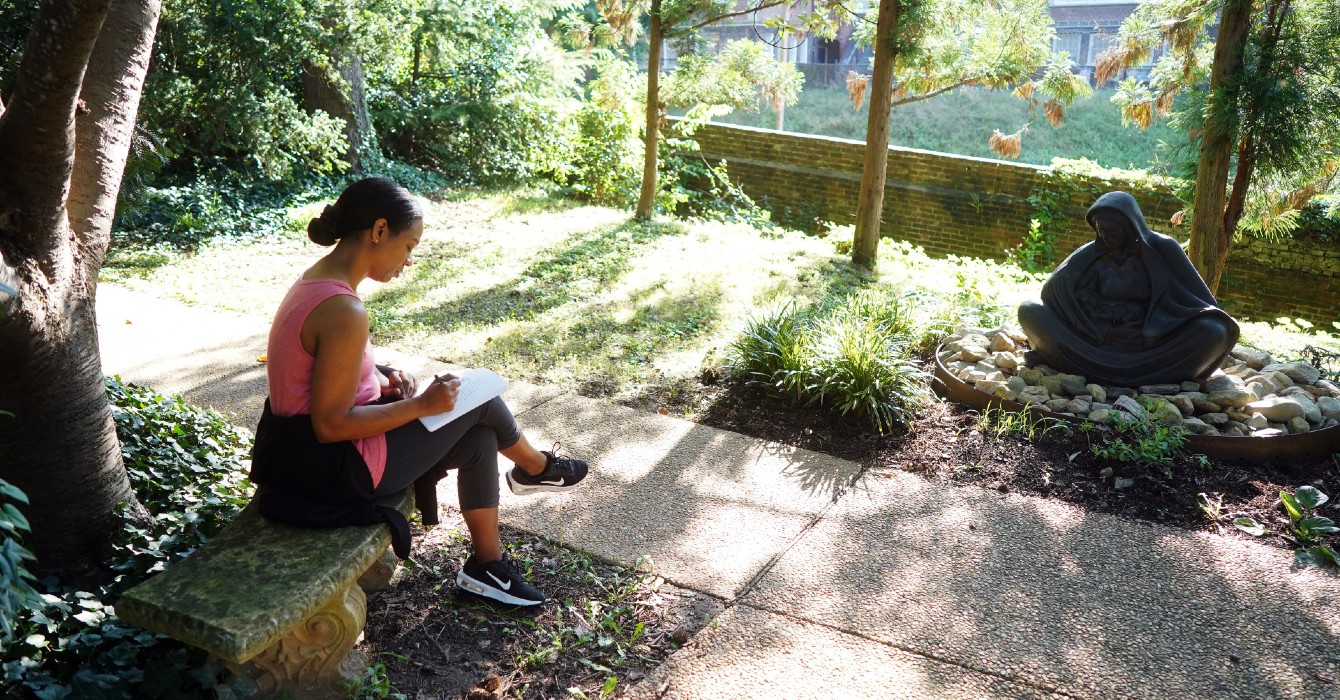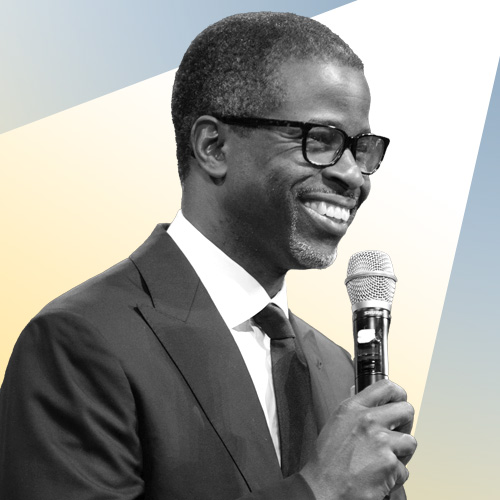To the surprise of many in the West, Christianity is flourishing in China today, but it is a uniquely Chinese form of Christianity that grew outside of -- and often in opposition to -- the missionary movement, said Xi Lian, an authority on the church in China.
“The roots can be traced to the early 20th century, when independent groups emerged outside of the missions, in some cases very antagonistic to Western missions,” said Lian, the author of “Redeemed by Fire: The Rise of Popular Christianity in Modern China.”
 Responding to the spiritual and other needs of the Chinese people in a time of great chaos, these groups developed an indigenous form of Christianity that resonated with people, Lian said. Following the death of Chairman Mao in 1976 and the Cultural Revolution, this homegrown Chinese Christianity emerged and grew in surprising ways.
Responding to the spiritual and other needs of the Chinese people in a time of great chaos, these groups developed an indigenous form of Christianity that resonated with people, Lian said. Following the death of Chairman Mao in 1976 and the Cultural Revolution, this homegrown Chinese Christianity emerged and grew in surprising ways.
Lian said the growth of Christianity in China has important lessons for the church in America and its understanding of missions.
“One lesson the church might have to learn, one way or another, is that at some point we have to accept our own limits,” Lian said. “That regardless of our desire, our intention, our hope, at some point we have to let go and let the church in those lands develop in its own way.”
Currently a professor of history at Hanover College, Lian will join the faculty of Duke Divinity School in July as professor of world Christianity. In addition to “Redeemed by Fire,” which won a 2011 Christianity Today Book Award, his works include “The Conversion of Missionaries: Liberalism in American Protestant Missions in China, 1907-1932.”
Lian spoke with Faith & Leadership while at Duke Divinity School for a consultation on Northeast Asia hosted by the Center for Reconciliation. The following is an edited transcript.
Q: Give us an overview of Christianity in China today.
What’s probably surprising to many people is the extent to which Christianity has flourished in China and the extent to which it has become a Chinese religion.
For decades after Protestant Christianity was first brought to China, it was resented and rejected by many people as a foreign religion, as part of this Western imperialistic expansion into China.
[In] the early 18th century, Christianity was banned, and missionaries were not allowed into China. It was only after the Opium War of 1839 that China was forcibly opened to the outside world. As China opened to Western trade and Western missions, Christianity spread into the interior of China, so it came as part of the Western expansion.
Unlike in the 16th and 17th centuries, when the Jesuits and other Catholic missionaries came to China with no gunboats backing them, in the 19th century you have gunboats backing these Christians working in China, and that’s why the Chinese resisted and resented Christianity.
That’s why for a long time the Christian population in China was just a tiny drop in the bucket. Even by the end of the missionary era, by 1949, when the Communists took over, only about three-quarters of a million Protestants were in China. By 1952, most missionaries were kicked out, so there was a general sense among the missionary boards and missionaries that “we have lost China.”
They did not realize that in fact by that time Christianity was beginning to take root in China, often in a way that was almost invisible.
Q: Your book says this has been a homegrown Christianity, an indigenous Christianity, that has taken root.
That’s right. That’s what’s behind the current flourishing of Christianity in China. The roots can be traced to the early 20th century, when independent groups emerged outside of the missions, in some cases very antagonistic to Western missions.
Those indigenous movements were able to respond to the spiritual, emotional and other needs of the Chinese population during a period of much chaos -- of warlords, of foreign aggression, of so much suffering. Their message met the Chinese people’s needs in various ways. In terms of the nationalistic sentiment, they separated themselves from missions, so they could say, “No, we are not the running dogs of Western imperialists. God directly speaks to us. We have a revelation from God.”
They also developed a form of Christianity that resonated with elements in the Chinese culture -- a kind of charismatic, Pentecostal worship with speaking in tongues, visions and trances. It was intelligible particularly to Christians at the grassroots level, and it was that kind of Christianity that survived the Communist persecution through the 1950s and into the chaos and the ravages of the Cultural Revolution and emerged after Mao died in 1976.
It emerged from all of this chaos and the persecution of the Cultural Revolution in a way that has really surprised people.
There are all kinds of estimates of the number of Christians. The Chinese government counts only the membership of the “Three-Self Church,” the state-sanctioned Protestant church, which is less than 30 million.
Some church organizations, particularly international Western church organizations, paint a more optimistic picture of Christianity in China and say it’s well over 100 million -- almost 10 percent of the Chinese population. But I do not think that is the case. My own estimate is more than 50 million Christians.
Q: What’s the significance of this growing Christian presence in China? What role will it play in shaping China’s future?
My view is different from that of some other scholars. One view that many people subscribe to -- and I would love to, but I cannot at this point -- is that Christianity -- the faith, values and principles -- will become part of the mainstream of Chinese culture and that urban, middle-class Christians will form the backbone of Chinese Christianity.
Because Christian values and principles are often democratic principles, the argument is that they will introduce principles of equality, of transparency and of responsibility into urban church governance, which will then be extended beyond churches into Chinese society.
But in my book, I was skeptical of the influence of these urban churches. I see the political potential of Chinese Christianity coming more from the grassroots. I’d rather see the middle-class, urban churches and the more institutionalized, more predictable kind of Christianity contributing to civil society in China; if that kind of political potential were to come from the grassroots level, it could come in explosive and unpredictable and sometimes possibly even violent ways.
Since that book, I have done more research on culturally elite, educated Christians in contemporary China, and I’ve come to appreciate more their moral courage in confronting some of the issues in China.
In 2012, for example, Yu Jie, a prominent Chinese dissident, was exiled and arrived in the United States. He is a young writer who converted to Christianity in 2003 and has been a very vocal, courageous critic of the Chinese government. So that kind of political and very often legal activism by Christian intellectuals is beginning to have an impact on mainstream Chinese culture.
In the long run, I think we can expect Christian influence to come not only from the grassroots level but hopefully also more from the elite.
Q: Is there any sense among the political leadership that maybe in fact these Christians are actually productive, contributing citizens and could have a beneficial role to play in China? That they could somehow perhaps be co-opted?
The Chinese government so far has welcomed one form of social participation or contribution from the church, and that is in the area of social services and disaster relief. The government sees no political risk when the church can mobilize its members to donate money to disaster victims.
But will the government at some point welcome the participation of these very patriotic, very China-loving Christian intellectuals who vehemently oppose the government’s policies? Particularly this very autocratic, very authoritarian form of government?
I wish I could say yes. But the government sees them as enemies. They feel threatened by them. So in the near future, I don’t see the government as being receptive to their ideas.
Q: What are the challenges of building Christian institutions in China?
The Chinese leadership has inherited an imperial mindset from thousands of years of dynastic history, which says everything must be placed under strict government control, particularly institutions.
The government becomes very nervous when people start to organize, and so far the only Christian institutions that are aboveground and legal tend to be those that are affiliated with the Three-Self movement, which is part of the government structure, so it’s very limited.
The Three-Self Church is very tame politically. They follow along with whatever the government urges the people to do. Basically, they have to give moral sanction to the government’s programs and extol the virtues of good citizenship and loyalty to the motherland and things like this.
So I would not expect any meaningful institution building coming from that context. As for a more independent kind of institution building, you almost immediately run into a political minefield and have to be very careful doing that.
Q: Strangely, it sounds like the government has allowed a huge measure of entrepreneurial freedom in business and other areas, but it doesn’t sound like they’re ready to do this with the church yet.
Absolutely. Even some of the top Chinese leaders have admitted that there is a real gap or inconsistency here.
On one hand, you have this unregulated, wild form of capitalism and market capitalism, with a lot of economic freedom. But on the other hand, you have this continuation of very repressive political institutions.
Q: What are the lessons for the church in America? What would you want American Christians to know and understand about the church in China?
I’m a historian, so I have my bias, and that bias is that we need to know more about the history, about the past.
Throughout the modern history of the missionary movement, not just in China but in Korea, Japan and other parts of the world, there’s often this desire, this very innocent urge, to shape the mission field in one’s own image. You want to transport the denominational structure, the rituals, the practice, the theology to the mission field and build your version of church there.
I can understand that would be very satisfying. But very often one fails to understand that the local population reacts differently. To them, it may be very satisfying to become a Christian. That’s it. It’s not at all satisfying to become a Presbyterian, a Methodist or a Baptist.
Very early in the modern missionary movement, you had some interdenominational partnerships, but later these missionary efforts reverted back to a denominational model. So you had this strange phenomenon of Southern Baptists in North China, Northern Presbyterians in the South and so on.
In many cases, these are well-meaning efforts, but the reality is that in order for Christianity to come to life in a foreign land, it has to acclimatize in its own way.
One lesson the church might have to learn, one way or another, is that at some point we have to accept our own limits -- that regardless of our desire, our intention, our hope, at some point we have to let go and let the church in those lands develop in its own way.
Q: Tell us a little about your earlier book, “The Conversion of Missionaries.” It’s about missionaries in the early 20th century who went to China to convert others and who, in a sense, were themselves converted as they developed an appreciation for Chinese religion and culture.
That’s right. In some sense, that process is not surprising. I mean, you go into a country, and then you begin to live the life of the people there, and you begin to understand their struggles.
For instance, you have many American missionaries who were in principle opposed to communism and its violent ideology, but then you get to the country.
One of those missionaries whose story I included in the book is Frank J. Rawlinson. He became very sympathetic to the struggles of Chinese workers. He looked out his window from his office in a very nice, stately building in Shanghai and saw workers toiling to build another structure and the sun beating down on them, and he began to empathize with those people.
He began to understand the appeal of the Communist movement in China, its call for equality, and he urged other missionaries to be more sensitive to that kind of Chinese aspiration to address the injustice in Chinese society.
In other words, some of those missionaries were converted, in a sense, and one of the ways in which they were converted was to become more sympathetic to the Chinese needs and Chinese reality.





